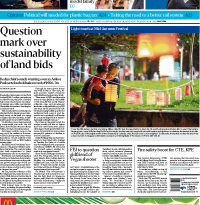EDITORIAL-SG: The Straits Times says- Public health is a national security issue
The Straits Times

In India, the world’s most elaborate lockdown of a population is now in its second week as the government wrestles with the coronavirus pandemic there. The noted economist Raghuram Rajan, a former head of India’s central bank, calls it the most serious public emergency since the country’s founding, when massive communal rioting ensued in the wake of the British colonial administration’s decision to grant freedom to India, and a new Muslim state of Pakistan. In Malaysia, and in the Philippines where Metropolitan Manila has been shut down, the closures have gone on for even longer. Indonesia, caught between the worsening outbreak and the need to protect the livelihood of millions living on the edge, is torn.
 Ads by: Memento Maxima Digital Marketing
Ads by: Memento Maxima Digital Marketing
@ [email protected]
– SPACE RESERVE FOR YOUR ADVERTISEMENT
In many of Asia’s countries, the picture is grim and complicated by social factors, particularly religion. Pakistan, which had difficulty controlling polio, is caught between enforcing social distancing and an aggressive Muslim clergy who insist there should be no restrictions on prayer assemblies. It quarantined 20,000 people who attended a Tablighi Jamaat event in Lahore last month, and is looking for thousands more. India has a similar issue on its hands with Jamaat attendees even as a Sikh preacher, who died of Covid-19 after returning from Italy, may have put at least 15,000 others at risk. Jakarta too is concerned about the vast migration “back home” that traditionally takes place at the end of the fasting period.

Finance ministers inevitably have to balance competing pulls on the national budget and too often they tend to take from health to give elsewhere, such as to defence and security. Some 15 years ago, Pakistan had 1.3 hospital beds to 1,000 people. Today, that ratio has halved. India barely does better, while in Indonesia the ratio is about 1.2 beds to a thousand population. It has three doctors to every thousand people, whereas next door, Malaysia has nine per 1,000. Unsurprisingly, the disparities show up in mortality rates. As of Monday, Indonesia had 209 confirmed Covid-19 deaths and 2,491 infected. Thailand, which has the best public health programme in Asean after Singapore, had 26 deaths and 2,220 infected.
 Ads by: Memento Maxima Digital Marketing
Ads by: Memento Maxima Digital Marketing
@ [email protected]
– SPACE RESERVE FOR YOUR ADVERTISEMENT
Singapore aside, not many countries around the region fully recognise public health as being integral to national security. Now that every country is tackling the pandemic on a “war footing” so to speak, it is time for all, particularly the middle-and lower middle-income Asian nations, to reassess priorities and aim to provide higher allocations for health budgets. There are compelling reasons to do so. Lifestyle-related diseases such as diabetes and hypertension, in some ways related to rising prosperity, are taking on menacing dimensions. Environmental factors and better detection are combining to cause spikes in cancer incidence. Besides, this surely is not the last virus outbreak that Asia will have to face.
.










